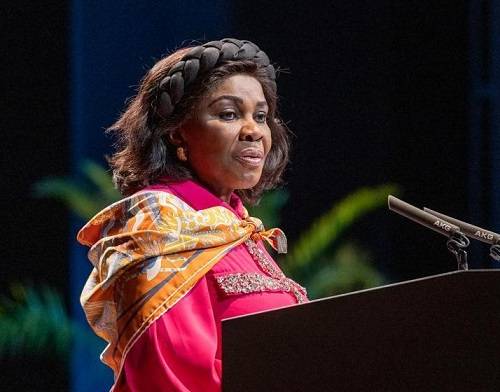
The Minister of Sanitation and Water Resources, Ms Cecilia Abena Dapaah, has underscored the need for governments to scale up efforts in the delivery of Water, Sanitation and Hygiene (WASH) services by adopting a systems approach.
According to her, adopting a systems approach, where the delivery of WASH services is connected to various systems such as health, agriculture and urban development, would help build a resilient economy.
Ms Dapaah said this when she delivered the keynote address at the All Connect International Symposium on Wednesday at the Hague, the Netherlands, which brought together more than 700 change makers and system leaders from WASH, health, climate, economic development and social justice.
The event was under the theme; “Strengthening all systems: Building resilience with water, sanitation, and hygiene (and wider public services)”.
In attendance were ministerial level delegation from ten countries, including Ghana, and convened by international think tanks, such as IRC Wash and Water for Good, both Non-Governmental Organisations (NGOs), in collaboration with other partners.
Ms Dapaah further explained that the adoption of a systems approach had become necessary because the challenges faced by governments, including the COVID-19 pandemic, were multi-dimensional and could not be solved by fragmented and siloed thinking.
“The recent disturbing global developments, including the worst global health pandemic, and the resulting economic challenges has taught us many lessons. To turn things around, recover and build resilient economies require a systems approach,” Ms Dapaah said.
“As system leaders we need to think, act and work differently to connect systems and drive change. It is essential that as we build resilient systems to deliver WASH services, we also connect to other systems such as health, agriculture, and urban development because the multi-dimensional challenges we face cannot be solved by the fragmented and siloed thinking of the past,” Ms Dapaah added.
She noted it was about time governments across the globe took action that was geared towards the achievements of the Water Action Agenda adopted by member states of the United Nations (UN) at its Water Conference co-hosted by the Government of Tajikistan and the Netherlands in March this year.
As custodians of the agenda, Ms Dapaah urged governments to double up efforts in providing national systems leadership by engendering support and creating an enabling environment that would allow the delivery of safe and sustainable services to everyone.
Following the adoption of the Water Action Agenda by member states of the UN, the Government of Ghana (GoG), Ms Dapaah said, intends to develop a Presidential Compact for water, sanitation, and hygiene.
The Presidential Compact, according to the Minister, would be anchored at the Presidential level to illustrate and bolster government’s leadership and commitment to make universal access to WASH services to all Ghanaians a reality.
In addition, she asserted that the GoG would look to push through two pieces of legislation that would establish a National Sanitation Authority and convert the Community Water and Sanitation Agency from a facilitator and project implementer to a Rural Water Utility.
Ms Dapaah further stressed on the importance of collaboration between Governments, development partners, technical experts, financiers and other relevant stakeholders in building resilient systems to ensure the provision of sustainable WASH service for all.
BY BENJAMIN ARCTON-TETTEY







